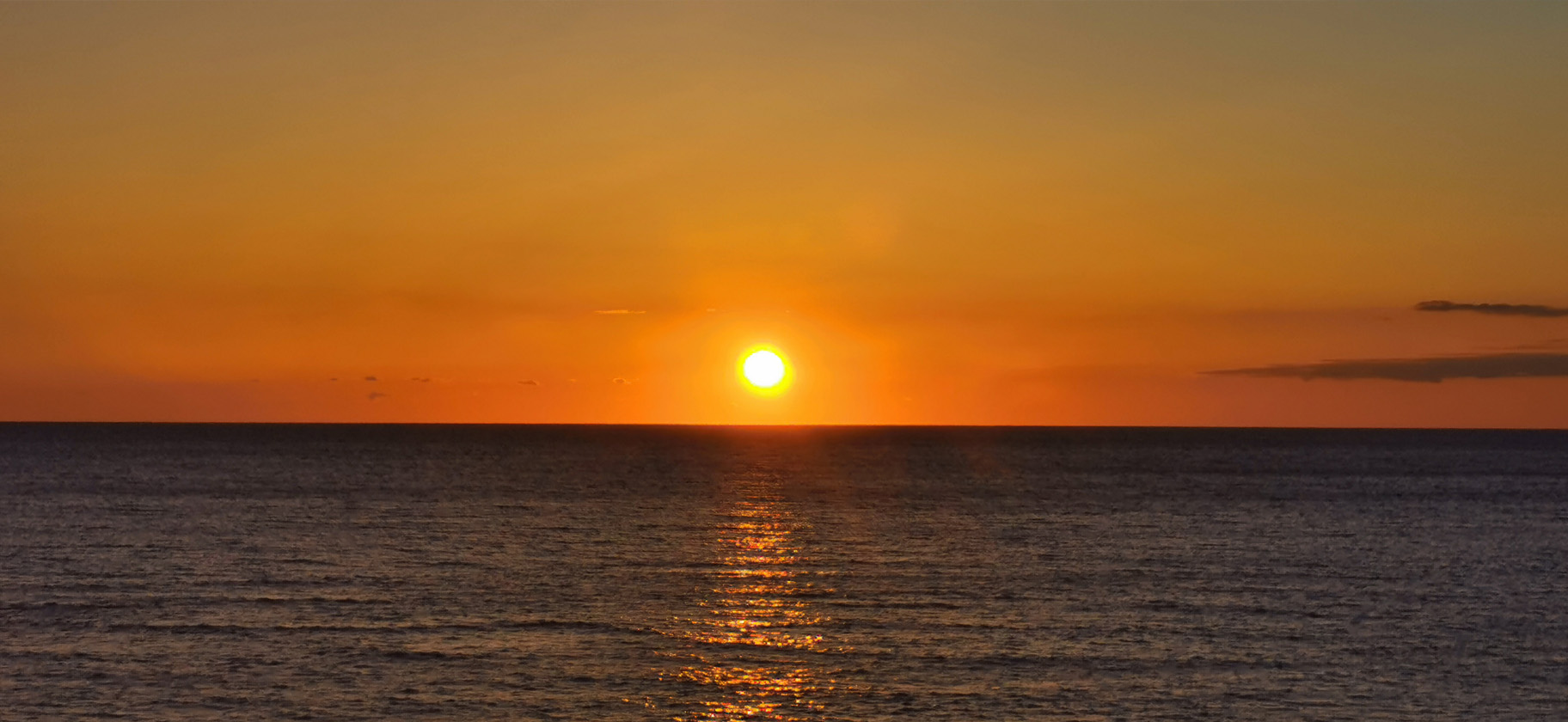Shqipëria
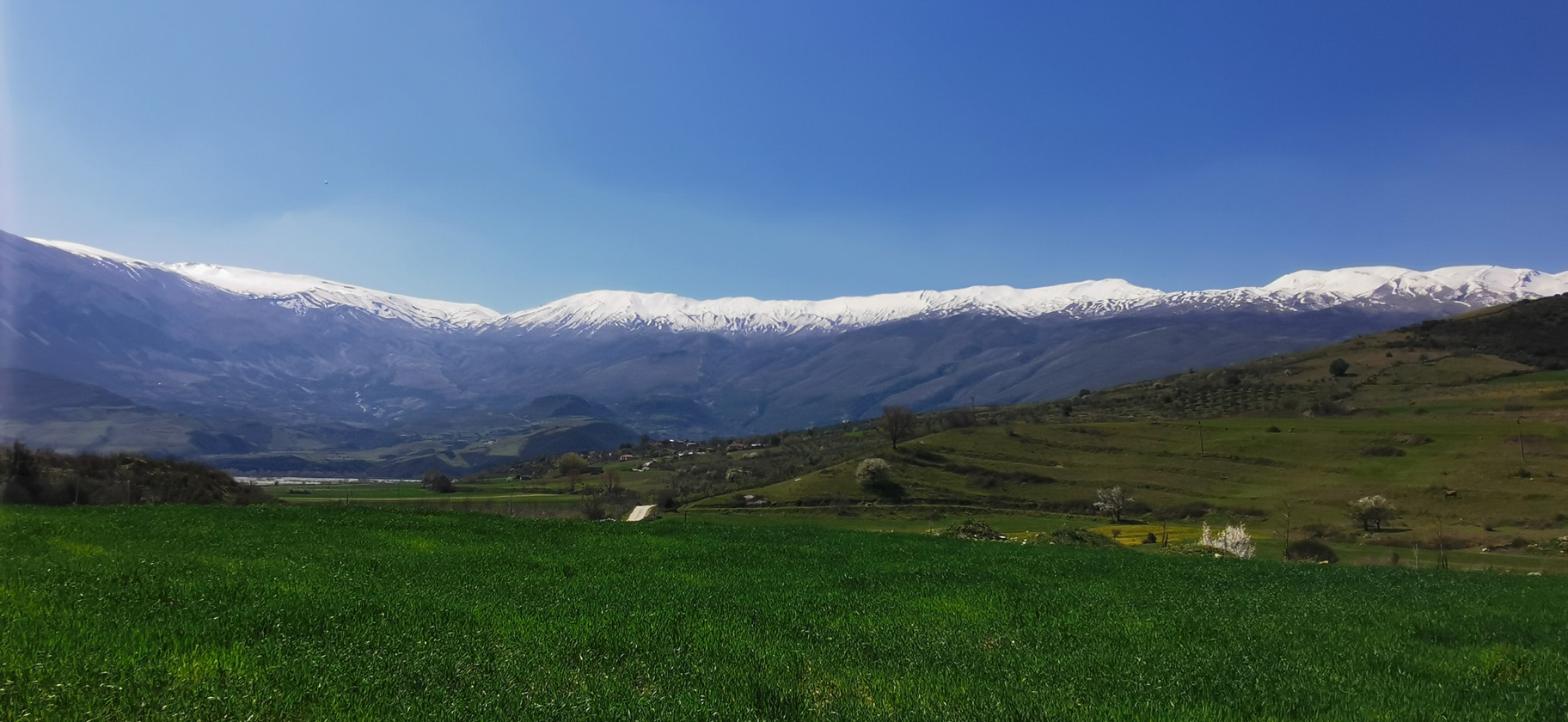
A fox lay by the side of the road with its eyes rolled back, its insides on the out, and with loose bits of gravel clinging to its fur. Teenage boys stood in the middle of the crowded motorway selling bootlegged CDs as cars and trucks jostled for position through construction on a laneless highway. We had navigated the narrow winding streets of the dusty neighbourhood on the outskirts of Tirana between downtown and the airport and were now, according to the GPS, on a straight shot into the city.
Damien is an international police officer from France who was headed up to Shkoder by the border with Montenegro where he was going to be stationed for a month. We were on the same flight from Belgrade on a rickety old prop plane that caught every bit of turbulence. He had heard me negotiating prices with the attendant at the Vodaphone kiosk at the airport, figured that I was one of the few people on the flight that wasn’t Balkan-born, and offered me a lift into the city. The terminal at Tirana Airport is small and, with only a few flights arriving and departing daily because of the pandemic, it was a lifeless place. Despite the downturn in tourism, cabbies still wait by the exits and glom onto whoever walks out of the doors so when Damien caught me trying to deflect their attention, he took pity on me and invited me to join him in his rental car.
“Yeah, it’s a mostly Muslim country here,” he said. “But they are not strict with it. They eat pork and they drink. Women don’t wear headscarves or anything. And, look,” he continued motioning with his head toward the window, “I say that right as we pass by a woman in a headscarf.”
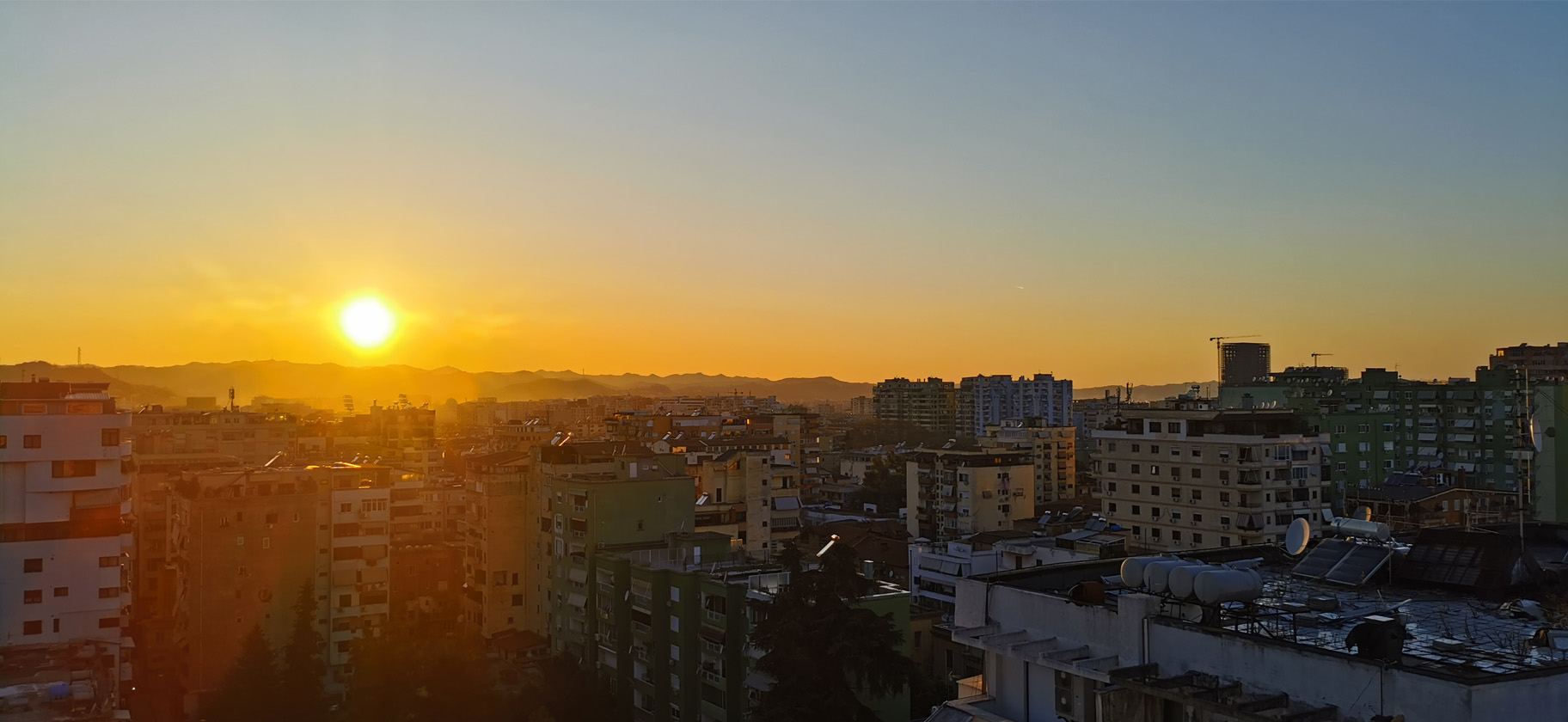 Blloku is a neighbourhood south of the canal that is just five roads running north-south and eight roads running east-west. During the Communist era, it was closed off and reserved only for Enver Hoxha and the party elite. Since his death, it has become the hippest spot in the city with cafés and lounges on every corner and updated apartments in the old square block apartments that were built in the 70s that have peeling paint and countless wires dangling on the outside.
Blloku is a neighbourhood south of the canal that is just five roads running north-south and eight roads running east-west. During the Communist era, it was closed off and reserved only for Enver Hoxha and the party elite. Since his death, it has become the hippest spot in the city with cafés and lounges on every corner and updated apartments in the old square block apartments that were built in the 70s that have peeling paint and countless wires dangling on the outside.
Dining establishments had reopened across the country. Although a curfew was in effect, you could sit in a café and while away the time. At every hour of the day, somewhere an Albanian is drinking espresso. Masks were optional and people were smiling and happy to be out in the sunshine again. At Qebabtore Gjakova, for what it may lack in charm, you can sit and get 4 grilled kebabs, peppers in yogurt, and a slaw salad with a shot of raki for a few bucks. You can hop into a furre buke and pick up a slice of burek for 50 cents or slip by a pasticeri and buy some baklava or trileçe. Even as early as March, the street-side markets were showing all of their colours with tomatoes, strawberries, and zucchinis in season along with aubergines, oranges for juicing, and bananas shipped in from Ecuador.
Heading up to the north side of the canal and into Skanderbeg Square I notice a lump of phlegm developing in my throat. I worry that maybe the virus has found its way into me again but a check of the European cities ranked by air quality has Tirana ranked as one of the worst on the continent.
Striding east down the pedestrianized Toptani lane, past the lounges and bars in the old castle to the modern four-storey mall at the far end, I stumble out into Pazari I Ri and the old market around the Sheshi Avni Rustemi roundabout. It is all kebab shops lined up side-by-side at the end of Rruga Luigi Guraquki with access to the market through the narrow laneways on the north side of the street. I need to piece together an evening meal so I bargain with the various vendors for some olives, kashkaval and crudo.
The girl at the SurPrice rental office inside the Rogner Hotel asks me where I am from and, after I answer, I return the question and she says that she is from Tropojë.
“It’s a small village in the north,” she says.
“Wait a second,” I say. “I’ve heard of Tropojë. That’s where all of the bad guys are from in that movie.”
She giggles with embarrassment.
“I am sure it’s not really as bad a place as the movie makes it seem,” I say with a smile, “and that it’s just a pleasant little village, right?”
“Yes, yes! It’s not like here in the city. There, the people have a very strong sense of community. And, I mean, the men sell drugs,” she states matter-of-factly, “but they don’t kidnap people.”
Leaving Tirana tests my patience and resolve. Traffic is a mess of driverless cars parked in the middle of the street with the hazards flashing, pedestrians blindly traversing the street, and every car trying to pass and not be passed by every other car while venturing into oncoming traffic in the process. There are policemen at major intersections blowing whistles and waving batons conducting the disordered orchestra and the wall of sound of old trucks and scooters. Roundabouts are a lawless jungle where he with the rawest nerves, or driving a Mercedes Benz, goes first.
Outside of the capital, it is a smooth ride along an open highway through the mountains as far as Elbasan. Routes south off the main highway are closed for construction so motorists need to head west to head south. Albania’s road signs are a mess of letters making place names that I had never heard of before I needed to know them. At Rrogozhinë the highways intersect and I turn south toward Lushnjë before taking the route back toward the mountains and up through the hills into Berat.
Berat sits in the valley with Tomorri Mountain to the east looming over it. The City of a Thousand Windows straddles the Osum river with a maze of medieval lanes and cobbled roads on one side and homes built during the Ottoman occupation up along the cliff on the other. The new Berat built on the far side of the hill is dusty and undergoing heavy construction. There are fish shops and electronic stores, and groups of men sit at picnic tables playing dominoes in the shade. In old Berat, at the top of the hill sits the old castle complex which has a commanding view overlooking the city out toward Tomorri. In the valley behind the hill looking off to the northeast, greenhouses and small mining operations stretch on through the haze as far as the eye can see.
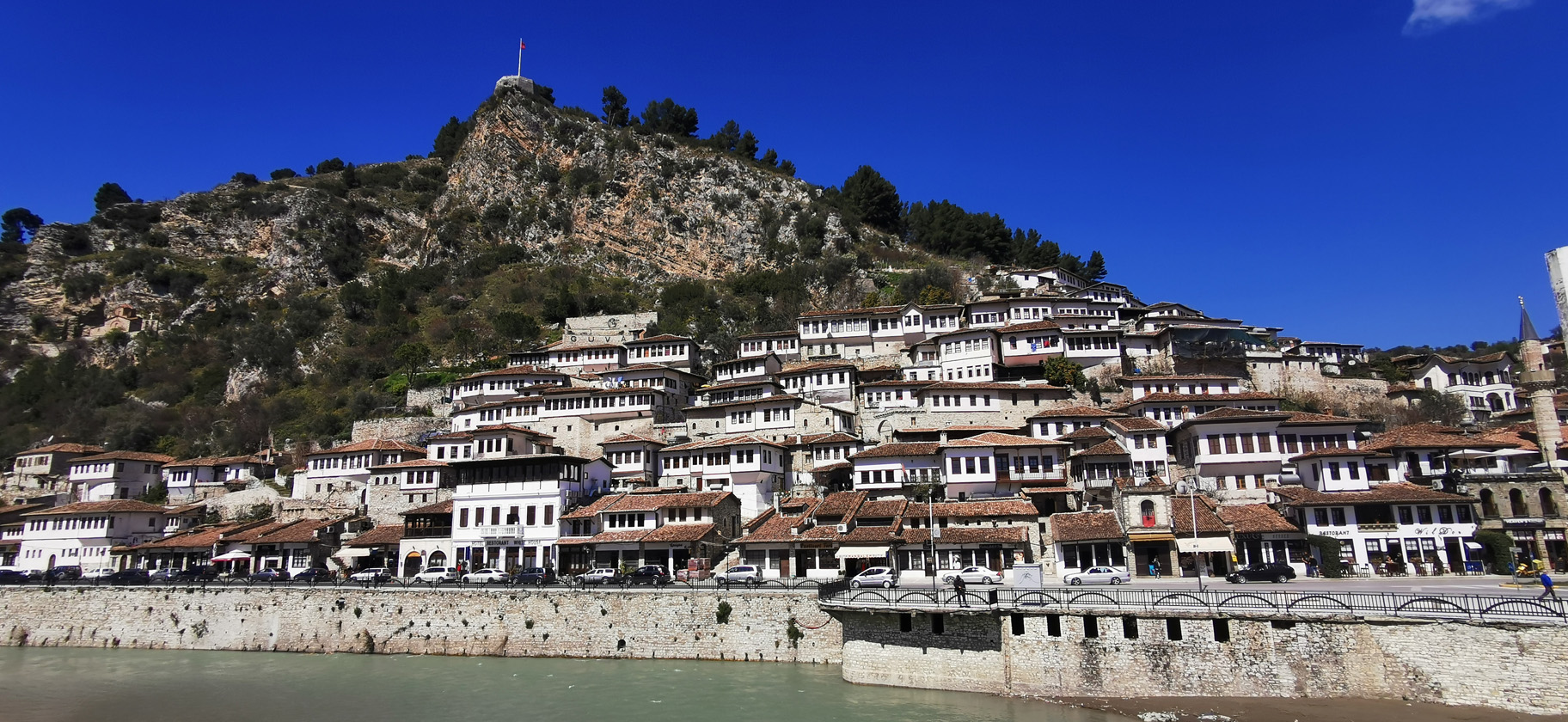
Igli and his family run a guesthouse just off the main cobbled road running up the hill to the castle. He is proud to show off how well his teen-aged daughter, Klea, speaks English as she guides me through the courtyard and into their home to my room. They are excited to see a visitor and hopeful that the decline in tourism on which they depend is coming to an end. They invite me to supper where I am fed stuffed escalope of veal with a Greek salad and ferghesë along with some astonishingly good raki. Chickens cluck away looking for their own evening meal before the sun sets and prayer call rings out from the nearby mosque.
Gjirokaster was founded before the invention of the automobile, so driving up to the old town takes a certain degree of skill behind the wheel. Like most towns that are built around a castle sitting atop a hill, the views from anywhere looking out toward the old farmsteads crawling up the mountainside are breathtaking. Life in the Bazar has been calm all year. A few regulars sit at picnic tables in the sunshine outside of the restaurants at the end of Rruga Evila Celebi drinking beer and smoking cigarettes. Julio is surprised to see a visitor from out of town and is ready to provide everything on the menu even without asking. It is past noon and a gorgeous sunny day so family and friends stop in for hugs and to pick at the burek and stuffed eggplants and peppers that had been prepared earlier in the day. I am stuffed on qefqi and burek and the bill has already been settled but grandma, the chef, is rolling up qofte in a napkin for me to take on the road.
The highway twists and turns up through mountain passes and past old farmsteads and small mining operations half of which are abandoned. A lone restaurant or a hotel might be sitting off the side of the highway by a river or looking out toward the mountains. Cars on the highway speed past me travelling well over the posted limit. Trucks hobble and bounce at a snail’s pace well below the posted limit while motorists file in behind them waiting for spaces in the oncoming traffic so that they can pass. Most of the motorists are young men. If you see a Mercedes or an Audi, it is travelling 160 kilometres per hour or more with little concern for anyone’s safety. Any other automobile is a relic from a time mostly forgotten and barely able to hit 60 kilometres per hour as it spits a trail of black soot from the exhaust pipe.
Ksamil is considered Albania’s best low-key beach experience and I arrive in the mid-afternoon hoping that my senses will guide me to somewhere to stay. There is little activity in the street and few shops are open. The sun is out again and sparkles are shimmering on the water in the afternoon but there is a shade of gloom lingering in the air. Traffic has stopped and only a few trucks transporting bricks and cement roll through town kicking up dust as they go. I open up my phone and inquire about accommodation using one of my apps. Erlan responds right away and is eager to help find me a place to stay but all of the hotels by the water are boarded up and undergoing construction. Erlan is pushing an accommodation at a rock bottom price closer to the highway but I have to tell him that there doesn’t seem to be any accommodation in this ghost town that will entice me to stay – there is low-key and then there is abandoned. I get back in my car with the day waning and hope that Sarandë will have some life left in her.
Sarandë is a resort city with decades of steady tourism to keep her going and, though life is moving at a slow pace, there is at least one hotel overlooking the sea and staring out toward Corfu with a room to let. Whether it is too early in the season or it is the pandemic is impossible for me to know, but every room is at my disposal and everything is negotiable. Sunset makes silhouettes of the buildings by the water as a calmness descends on the last of the restaurant diners preparing to head home before the curfew comes into effect.
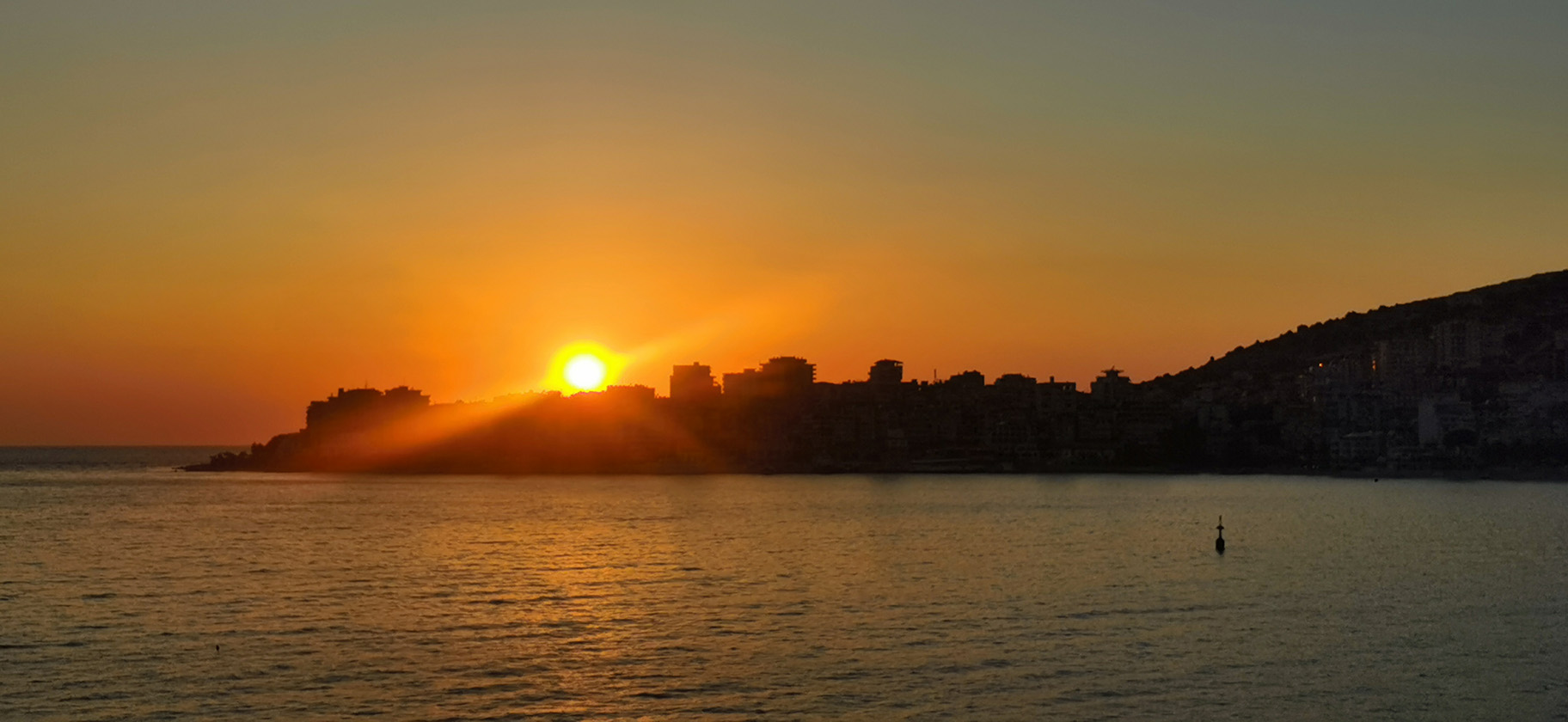
The seafront is mostly hotels, seafood restaurants and gelaterias. There is a patch of rocky beach at one end and the port is at the far end of the bay where the rest of the city sits on a hill. Pre-pandemic, visitors could take a ferry over to Corfu for a day trip but these days the border is closed. Businesses are open but patronage has been reduced to a trickle and is mostly locals. The city is taking advantage of the low season and renovating the boardwalk.
There is a steady presence of men in suits and leather jackets in the hotel lobby bar. They all have the same short haircut and stubble and are overweight by ten kilos. By 8 am the lounge is full of them and each is drinking a beer alongside their espresso and smoking a cigarette. There is a widely held stigma that Sarandë is controlled by mafia thugs and though all of the men in the lounge look the part they seem more bored than up to no good.
I am ahead of schedule and calculate that I have time to spare and can settle in somewhere along the Albanian riviera but every quaint beach town with any renown between Sarandë and Vlorë has been abandoned. Borsch, Qeparo, and Livadi beach show accommodations available on booking apps, but the situation on the ground tells a different story. The beaches are rocky and dusty and lined with idle bulldozers. Grandiose international hotels have no staff and the doors are bolted shut. Beachside businesses have been gutted or boarded up. A small herd of cows or goats grazing in the woods nearby, or the occasional stray dog nosing through a pile of garbage, are the only signs of life. The situation requires a change of plans so I trust that, like Sarandë, being a larger city, Vlorë will have places to stay.
Driving along the coast out of Dhërmi and the road begins to ascend up a mountain. It is slow going up a steep incline and sharp turns. There is a pull-out at the top looking down at the beaches of the riviera to the south. The peak of Mount Çika to the east is dark and foreboding. Walking down the bluff to the edge of the cliff there is a couple sitting on a rock taking in the view.
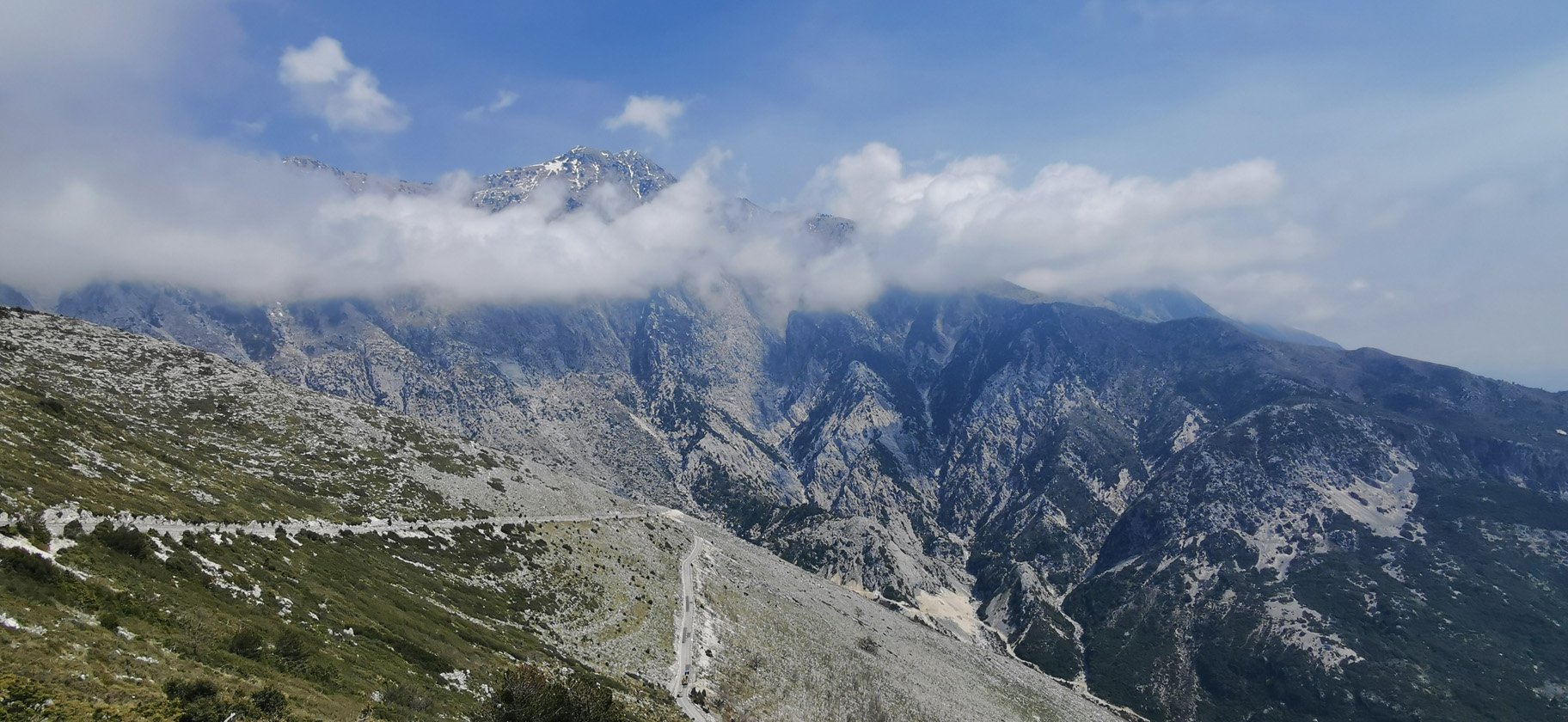 “It’s beautiful,” I say.
“It’s beautiful,” I say.
They have travelled from Germany to spread the gospel of the virus they say jokingly. According to the German authorities, Albania is closed for tourism, but there they are enjoying their vacation. They will not have to quarantine when they return to Germany because theirs is the one state that cannot enforce it owing to a man who filed a lawsuit against the government, stating that enforcing a quarantine was unconstitutional, and won. He works in a shop in a village near Köln and says that we have become hypnotized and confuse the news with reality. “If you believe the news,” he says, “then everywhere you go the world is ending. But then you go and you see that it is not. Life goes on and people live. And there are some people who have made it a point to speak loudly and make their health my responsibility. It’s crazy!”
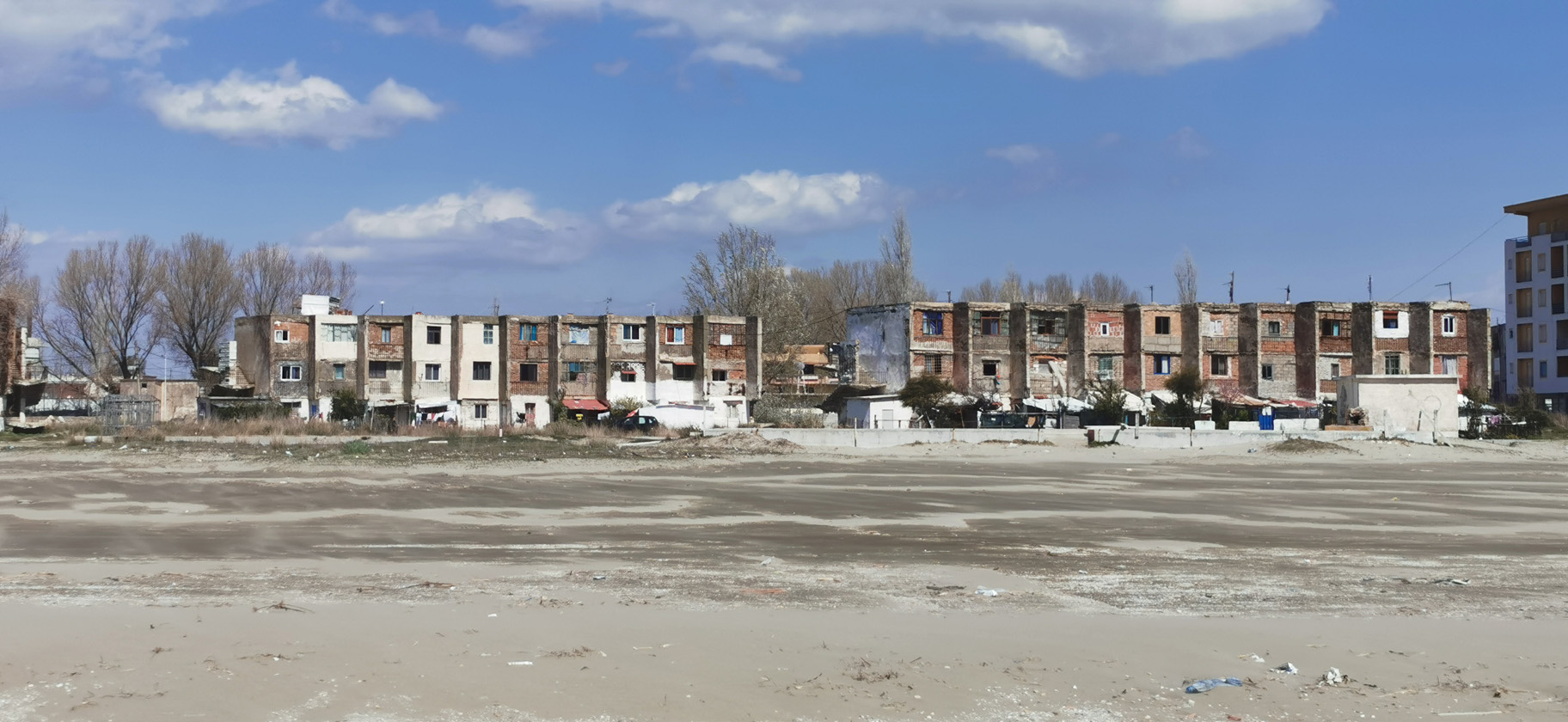 Vlorë is a bustling town on the weekend filled with folks who have come in to shop and trade at the village market. The wind blows hard and heavy off the water sending sand from the beach into the city that sinks into the holes of your teeth. The sand by the beach is soft and the water is cold. Summer is not far away but it is too early to be enjoying the seaside. Vjeter Beach on the north end of town is a wide-open stretch of sand that has yet to be invaded by massive hotels. It is an ideal spot but the lots by the water lay fallow or unfinished. A single apartment complex with a restaurant on the ground floor sits alone in the field with the view.
Vlorë is a bustling town on the weekend filled with folks who have come in to shop and trade at the village market. The wind blows hard and heavy off the water sending sand from the beach into the city that sinks into the holes of your teeth. The sand by the beach is soft and the water is cold. Summer is not far away but it is too early to be enjoying the seaside. Vjeter Beach on the north end of town is a wide-open stretch of sand that has yet to be invaded by massive hotels. It is an ideal spot but the lots by the water lay fallow or unfinished. A single apartment complex with a restaurant on the ground floor sits alone in the field with the view.
The weather by the seaside is unpredictable and occasionally the sun likes to sneak out and tempt you into thinking that summer has arrived. Newlyweds run down the steps from the hotel restaurant to the seaside hoping to snap some pictures while the weather permits only for their hopes to be dashed and the bride’s veil to be blown off of her head and into the waves below.
When the evening comes, the traffic picks up as the police head into the streets with their whistles and their batons to direct everyone home. Each night, the sea calms and sends soft rhythmic waves onto the rocky shore. The sky turns orange as the sun lingers over the horizon asking for just another minute of freedom – another minute of peace.
Durrës is a major port city and the former capital city of Albania. Boats leave from here headed to Bari on the Italian coast but it is mostly silent on the water now except for a few fishing boats that make a perimeter during the day and stay docked after sunset. The clouds roll in and the temperature falls pushing people indoors. Beyond the old city centre the streets sprawl out in a grid off the highway. The buildings are old and the concrete is not being maintained. The paint on the exterior is cracking and old bricks are being worn away by time. People are more on their guard here as case numbers have made them more cautious than folks in the capital or further south. Dimly lit barber shops remain open and you can always get an espresso but many of the restaurants have remained closed voluntarily. A dozen people stuff themselves into a small concrete block out of the rain at the only place to buy burek. Small families try to keep the children busy by going for walks along the waterfront and purchasing tokens for carnival games. A small contingent of teenagers defy the curfew orders and throw a small birthday party after sunset at the far end of the beach before they are eventually shuttled home by the police.
There is a lot of oil in Albania and just as many oil companies. The highway corridor that runs from east to west between Durrës and Tirana and south to north up to Shkoder represents the economic heartland of the country of which oil is one of the largest sectors. It is hard to drive more than a kilometre without driving past at least a few petrol stations. Along with the sea to the west and the mountains to the east, they are a feature of the Albanian landscape. Gega, Bujari, Halili, EKOOIL, Prelashi, Emanueli, IZERI, Standard, Ervini, Imperial, LPG, START OIL, ANEL, Elda, Alpet, XHENI, Laçi, AGIPetrol, Avullija, BOLV, and Kastrati, are just a handful of the gas stations you are likely to drive by along the route.
Brikela greets me at the MoneyGram along Rruga Besnik Sykja in Shkoder and hands me the keys to the apartment I have rented. It is cold and drizzly outside as my time in Albania is drawing to a close and it is time for me to think about what comes next. The Eastern Wall feels impenetrable and my options are few. Now that I have a kitchen, visiting Shkoder from fruit stand to fruit stand to source ingredients is the way to pass the time when I am not otherwise working or waiting for laundry to dry in the damp cold. I make several trips through Gjuhadol because it is the most pleasant area of town in which to stroll but I also have errands I need to run. I fetch envelopes and stamps for a letter that needs to be sent. I have no experience using Albania’s post but I am optimistic it will make the journey. Somehow, we all manage to get to where we are going.
The days are counting down but for now I have ways to fill them. A cup of coffee for every morning and the computer gets opened when the sun is up. Before noon hits I have earned what I need for the day. I drive out of town toward Shiroka all the way as far as the road will go. Five hundred more metres through the forest along the hills and the cliffs and I could be in Montenegro but investigating what the rules are is not something I am interested in undertaking today. There is a restaurant at the end of the road and I am greeted by a dog barking from the rooftop and an old man who hopes that I will stay to have something to eat. I tell him I just want to take a picture of the lake and, with a wave of his hands, he invites me through. I step out onto a pier of loose stones held together by wire as the waves crash onto the shore. Even in April, the mountains on the far side of the lake still have snow on them. I can still hear the dog barking but the world is more silent now than I have ever known. I used to think of silence and peace as best friends, but I have discovered that in that silence there is a deafening loudness that we have forced upon each other and keeps me from sleeping soundly through the night. My hand is not as steady as it used to be, my judgement a little left of centre, and my happiness askew. In the fury of the wind beating on the shore from the lake, I am filled with unease and worry that I have a sickness that none of my wandering can solve. Perhaps the path to happiness diverts away from the things we love most.
Krujë is thirty kilometres north of Tirana. The town itself sits overlooking the valley to the south toward the capital. Gjergj Kastrioti, known as Skanderbeg, is the hero of the country and Krujë a key location in Albania’s history and Skanderbeg’s crusade of resistance against the Ottoman occupation. Although Albania remained under Ottoman rule until 1912, during the 15th century when the Ottomans expanded into southern Europe, it was Skanderbeg and his rebellious band of Christians that halted their path westward into Christendom. One of his great victories was by reclaiming the castle fortress that still sits on the hill in Krujë. It is said, that upon his victory, within the castle walls he raised a red flag adorned with two black eagles – similar to the flag of Albania today.
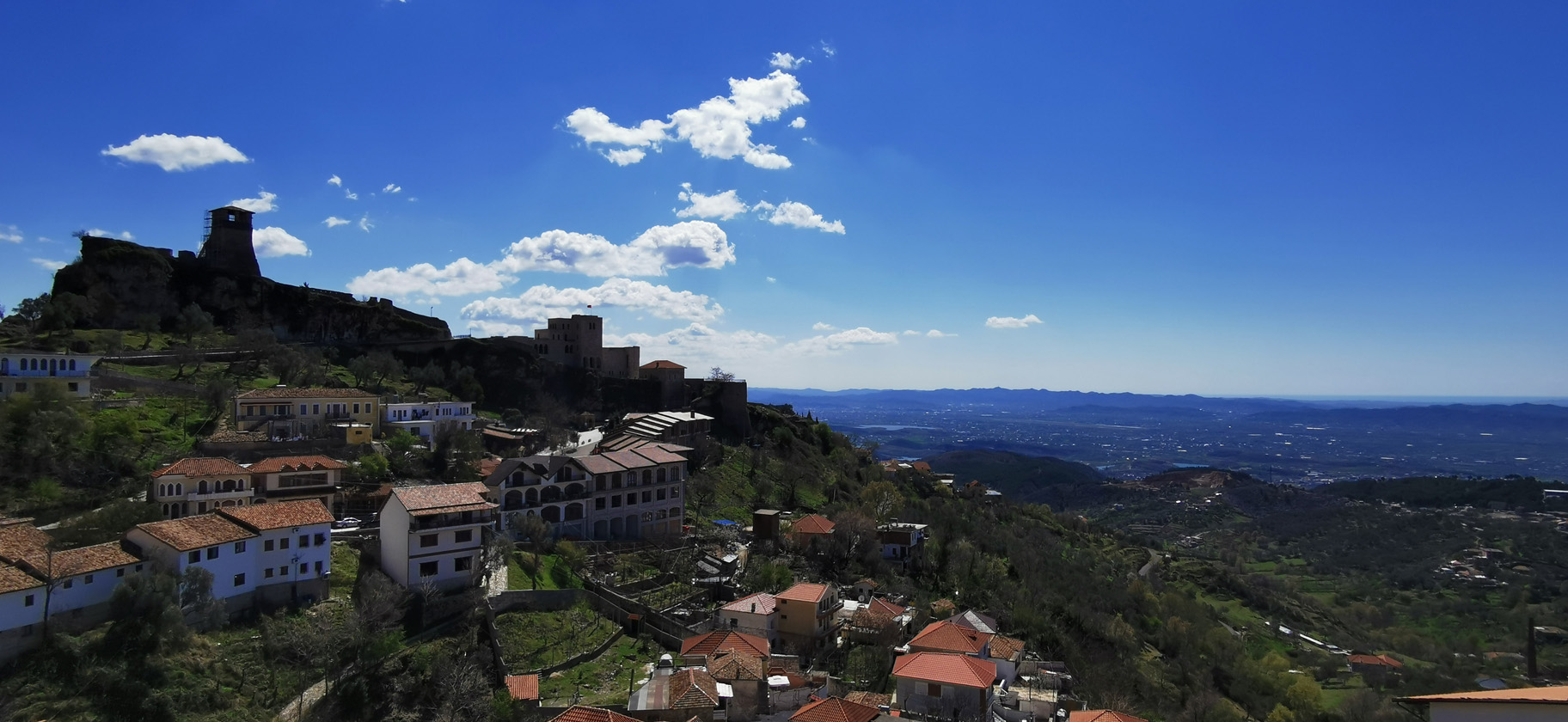
I still have a short drive to make, but I am happy to have made it this far unscathed which I see as cause for a small and understated celebration so I decide to dine in the hotel lobby. The Panorama Hotel and Restaurant is at the centre of the old town and a popular place for tourists to stay and for locals to eat, and it is one of the establishments in town that is always open for business. A group of men celebrating a birthday order beer by the barrels and plates heaping with mounds of grilled and fried meat without a vegetable in sight. Dorian works in tourism, asks me if I am enjoying my visit to Albania, and is curious how long I am staying in Krujë. He invites me out for a smoke which I decline – today doesn’t feel like the day for making friends. I made it this far and am nervous about the next steps. I am fixated and fatigued thinking about what to do and about what I can do. The Far East is calling but it is just too far to reach with too many small, but forbidden, steps in between.
Pulling into the Rogner Hotel is a relief. It is past noon and I have no plans including where to rest my head. It feels comforting to be back in Tirana. I recall these streets. I recognize the gelaterias and the markets. I decide to buy a bus ticket from a travel agent just off Skanderbeg Square to nearby North Macedonia who, according to the latest news, has seen cases rise but, like Albania, has no entry restrictions. The agent who sells me the ticket informs me that the bus station is behind the Pallati I sportit over by Zogu I Zi Square on the other end of town. I may as well find somewhere to stay up there.
I indulge in long walks to the outskirts of the city and to the parks away from the traffic to where families in Tirana live more peacefully. The boutiques and kebab shops disappear and are replaced with large apartment blocks. The men in jogging pants and faux leather jackets with cigarettes dangling from their lips disappear. Young boys improvise a football match by using the apparatus in the park as goalposts. Young mothers push prams and old men sit on benches discussing the news of the day.
I treat myself to a meal out at a restaurant – a simple pleasure that I had been denied for so long and that will disappear when I leave. The food is fine and the raki helps take my mind off the fact that the wave of cases striking the shores of Canada is turning into a tsunami. There is no place that is free of it and nowhere that is what it was. I think of the places I could be and examine the forces and every tiny decision that brought me to where I am and wonder if I am where I am supposed to be. Big thoughts help keep my mind distracted from fixating on the fact that I am eating just a few metres away from an indoor smoking section.
Fifteen men and a nun squeeze into a minibus and head out of Tirana up into the Albanian Alps toward Macedonia. Ohrid on the lake is only 140 kilometres away but the trip takes four hours because the bus needs to stop every thirty minutes to let the men off to smoke. As the bus ascends the mountain, it becomes clear that the rocks on the hillsides that can be seen from a distance are actually derelict concrete military bunkers and pillboxes – a testament to the violence that is endemic to the Balkans. Arriving at the border, an official comes aboard to collect our passports. The bus drives us into a hangar where we are ordered to descend and collect our belongings. An official searches through our bags for drugs and a sniffer dog is brought in to perform a check. There is not even a whisper of covid or any health protocols, but the official rifling through my bag asks me if I want to stay outside of the bus to have a smoke. Our passports are returned to us before we each proceed, one-by-one, on foot to the border guard on the North Macedonian side. He asks me where I was born and what language I speak and enthusiastically welcomes me to the state of North Macedonia. The men indulge in one last smoke before getting back on the bus and leaving Shqipëria behind us.
